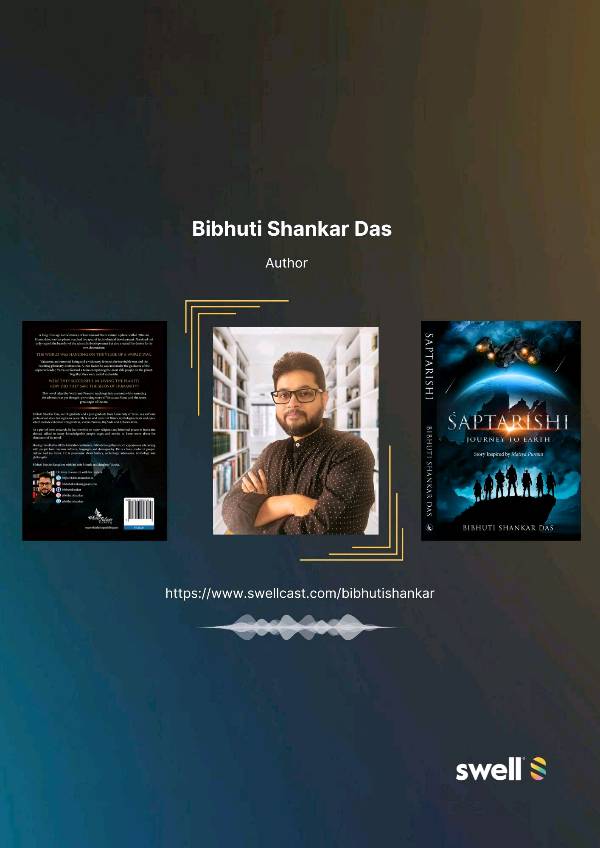
Damanpreet Kaur
@authordaman · 0:56
"Adventurous yet thought-provoking🤯 story of Vaivasvat Manu" -with Bibhuti Shankar
Either you wanted to help others or destruct others. The scientific developments also created the device for its own destruction. We will get to know about the ancient aces when once the world was hanging on the verge of the world war. We will be happy if you join the conversation with Bibut Shankar at 630 tomorrow in the evening. Till then, take care. Have a great day. Bye
Hello. Dhaman. Ma'am. This is Shashma. And eagerly waiting for this swell interview to start. Really nice topic and a really nice book. I am already intrigued by the explanation, the intro you have given about the book and the book cover that is shown in the photograph. So yeah, eagerly awaiting it. Thank you very much

Smita jojo
@Smitazzz · 0:23
Hi. I'm smita. So this book shaped rishi seems to be very interesting and catchy. It is a deadly combination of Sci-Fi and mythology, so I think we could find so much of suspense and mystery inside this book. So, yeah, looking forward to know more about this book from the author. So yeah, excited for the interview. Thank you

Bibhuti Das
@bibhutishankar · 0:24
You. Hi. Smita thank you. Thank you for being here. And that's right. So this book is actually a mix of historical fiction, science fiction, and also what you call as mythology. So it's definitely it's a very captivating read. And yeah. Thank you

Damanpreet Kaur
@authordaman · 1:10
Hello. Good evening everybody. I hope all of you are doing great. Today we will be having a conversation with Bibhuti Shankar Das who is an IIT graduate and a postgraduate from University of Texas. He is a software professional since last 17 years. He is an avid reader of Hindu mythological texts and epics which includes Srimad Bhagwatam, Vishnu, Puran, Rigveda Tharveda and he's a great scholar of all the Vedic and Puranic texts
Swell Team
@Swell · 0:15

Bibhuti Das
@bibhutishankar · 1:48
And what I perceived from what I read of these all Pranic stories, that there are a lot of teachings in this, there are many hidden meanings in the Kuplets and the verses that are there in the Ved and Puran. And the more I read, the more I developed the interest. And this is how it all started

Damanpreet Kaur
@authordaman · 0:43
The stories of Radhan Krishna are taught. What thought Das instilled in you. Before writing this book on Satrishi, what did you thought about when you started writing about the journey to earth?

Bibhuti Das
@bibhutishankar · 3:18
The story is similar, but the plot is different. All have the same kind of message for the world as how there was a great deluge, the great flood, and how humanity was saved from that great flood

Damanpreet Kaur
@authordaman · 0:46
Indeed. So this is the real problem in this world today, as it now has to be filled with goodness, but instead is now filling up with evilness. It's filling up with negative and bad vibes. Emotions are not good. People are being less kind and helpful. They do not want anyone to go beyond. They are to go at the heights. They are just being good at face, but not from the heart. I feel that your answer has just included all of my questions

Bibhuti Das
@bibhutishankar · 2:26
Another thing about this book is the question you might have come across as if our historical past, our religious past was so much technological advanced, how did we lose that technology? Or why did we lose that technology? That answer also you'll find in this book shaprishi as why it was required to lose that technology at that point of time. Apart from these, you will also find as why God, the supreme leader of this all universe, wants us to follow the path of Pune and avoid PAP

Vipin Kamble
@Vipin0124 · 1:59
My question to you is, as you are into WEBIC readings, pranic readings, mythological readings and writings too, as this is Kalyuk and we, the modern world people, we have forgotten most of the mythological things in our day to day life. Nobody wants to pray, nobody wants to listen to Vedas and Purans. What is your point of suggestion to the modern world parents? How they can inculcate basic mythological rootings to their kids?

Bibhuti Das
@bibhutishankar · 2:34
I would say we should not force the kids, but we should rather give them this book from the point of view, so as they develop the interest. And that interest would develop only when we tell them the moral of these stories. And these stories are not just written out of imagination. These stories were written for a purpose. And there's a technology background to everything that is written that is there in the Veda. So that thing we have to make them understand. So so thank you

mannya nayar
@shesalliwannabe · 0:16
Good evening. Mom, since you're into mythological readings, could you please tell me why and when? Is it assumed that Kalyo will finally appear in front of us early and guide us? Thank you

Bibhuti Das
@bibhutishankar · 1:27
And for each manwanthar there is a manu and seven subtrishis. And in total there are 14 manwantas that comprise of one culp. Now one culp is one day of Brahma or Brahmluk. So right now we are in the 7th Mannya of the culp. And in this 7th manwanthar, we are in the 28th Chatur Yug, or 28th Mahayug. And Vehaswath is the manu of this Mannya. So we are in Kalyug right now, and the span of Kalyug is four lakh, 32,000 human years
Very good evening to you bibhuti Shankar Dasar. I am Kadam Gupta and first of all, I would like to congratulate you for your book saptarishi the title in itself looks very interesting and promising. So my question to you is that sir how difficult was it for you to write this book and how much research and you know, study had gone into writing this book? So can you please tell us about this? And I wish you all the best for the future

Bibhuti Das
@bibhutishankar · 3:21
You. Thank you Kadambari, for your good wishes. Thank you so much. So let me tell you how I started writing this book. So I have been a reader of religious text like Puran, Mahabharat, Ramayan and also Ved. But Ved was little bit different. All other texts are stories, but Ved is not. So I used to read Ved, understand some part of it, or maybe I thought I understood at that point of time

Damanpreet Kaur
@authordaman · 1:19
I fairly believe that there were some mistakes or blunders done in ancient times. And yes, if we do not know about the history, we cannot talk about what could we do right in the future. Because when we know our past mistakes, we are ensuring this, that we are not going to continue that or we are not going to rephrase that mistake when in the future to avoid such distress like this technological advancement led to the destruction of Earth

Bibhuti Das
@bibhutishankar · 2:17
That Das not letting them edge. And they were fortunate enough not to meet any accident. So they lived a long life. And because of their long life, they learned many subjects, many things. They were master of Historical studies. Medicine, studies, astronomy, biology, physics, mathematics and several other subjects and that's all because of their long life and so when the Supreme Leader or Supreme God of the Universe Vishnu came upon a situation where the world was coming to an end

Damanpreet Kaur
@authordaman · 0:50
How do you believe that today's younger generation should embrace the values and virtues depicted in these ancient texts? What knowledge should they acquire regarding the Vedas, Upanishads and other sacred texts?

Bibhuti Das
@bibhutishankar · 2:38
Hello. Yes, dhaman pritji. That is very true. So in today's world, there's a lot of misconception that das been created for our religion and for our religious text. Now also coupled with this is they no longer call it as religious history. It is being called as mythology. Mythology itself means myth, which is not true. So my whole pursuit is to remove the dirt from this concept and bring out the shrine of our religious books, religious text in front of the world

Prabha Iyer
@PSPV · 4:07
Then there is a vast generation gap and they don't want to listen because they always grip that grandparents don't know anything. And grandparents say that you people have become so modern that you are not following any religious paths or the slokas, you're not chanting anything, you're not having any belief to God

Bibhuti Das
@bibhutishankar · 1:18
You. Thank you so much, ma'am, for your appreciation and suggestion. So many thanks for it. So, yeah, you have whatever you have told is the right thing. We should definitely proceed towards that, and then only today's generation would be able to realize that how glorious our religious past was. And then only they will be able to follow that path. So, yes, you are right. And as of myself so as of now, I am in the pursuit of writing

Damanpreet Kaur
@authordaman · 1:05
You hosting a scholar of religious epics, Vedas Puranas, is a pleasure, a very heartfelt thank you for sparing your valuable time for this wonderful conversation, having a talk with us, thus coming to my last question, which Vedic and Puranic teachings have left a profound impression on you. Is there a particular sacred text that holds a special place in your heart? And once again, I'm very grateful for your time and valuable talk. Thank you. Have a great day

Bibhuti Das
@bibhutishankar · 2:46
It says Satwan gupta Sarvas sosra DHA bhavati bharata saradha mayo pursoyo yachadra shah shah. It means you are what you believe in. You become that which you believe you can become. Thank you


